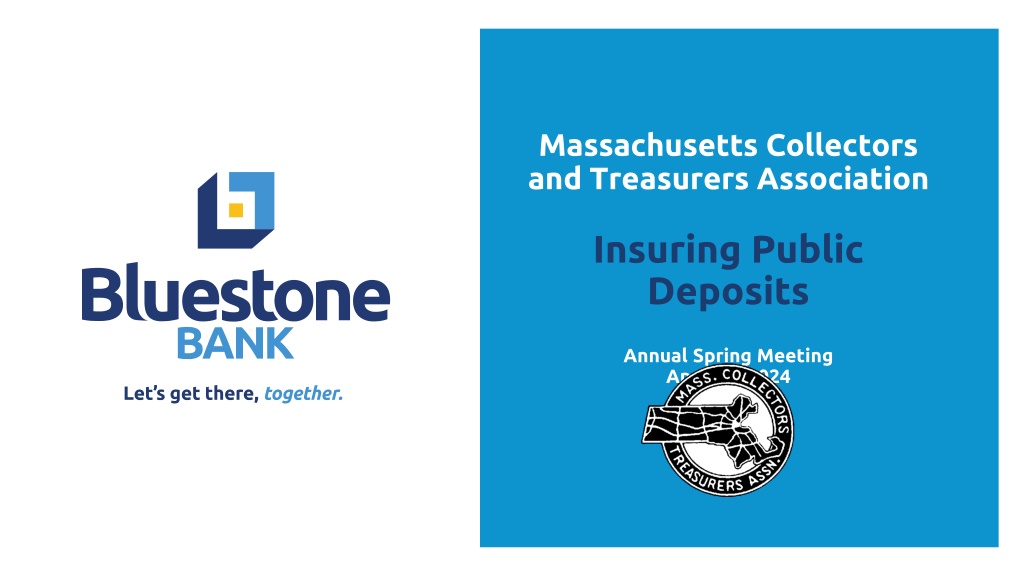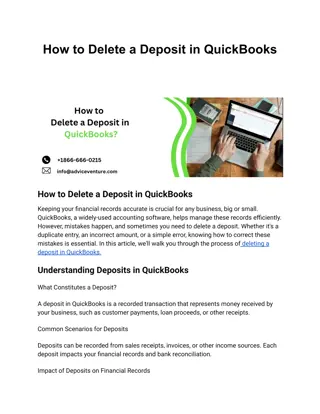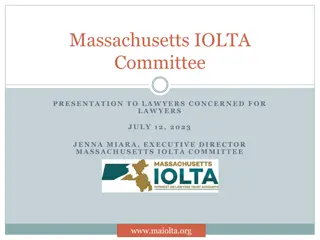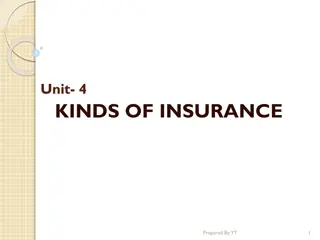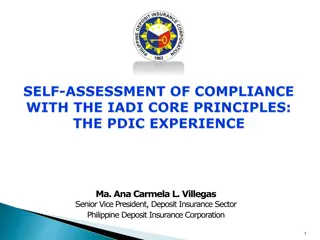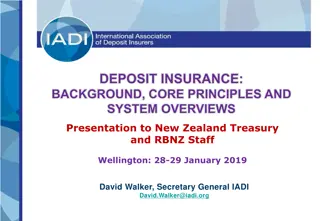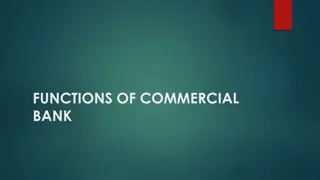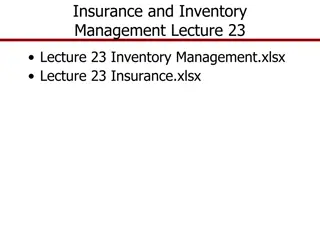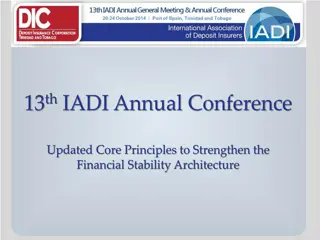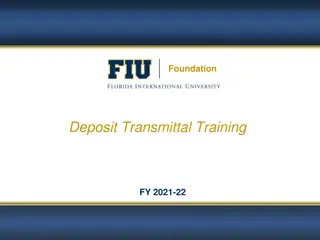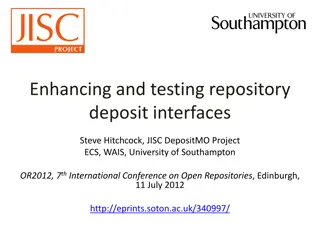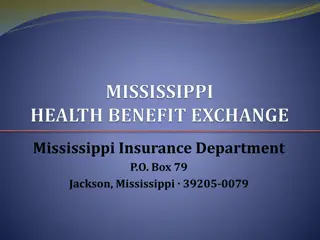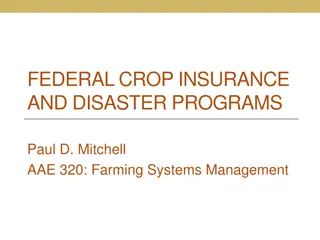Understanding Public Deposit Insurance in Massachusetts
Explore the intricacies of public deposit insurance in Massachusetts through an in-depth discussion on the regulations, investment policies, and the role of the Federal Deposit Insurance Corporation (FDIC) and Depositors Insurance Fund (DIF).
Download Presentation

Please find below an Image/Link to download the presentation.
The content on the website is provided AS IS for your information and personal use only. It may not be sold, licensed, or shared on other websites without obtaining consent from the author. Download presentation by click this link. If you encounter any issues during the download, it is possible that the publisher has removed the file from their server.
E N D
Presentation Transcript
Massachusetts Collectors and Treasurers Association Insuring Public Deposits Annual Spring Meeting April 10, 2024
Insuring Public Deposits Depositors Insurance Fund Donna P. Brunelli Vice President, Senior Government Banking Officer Bluestone Bank
Agenda Insuring Public Deposits in Massachusetts Federal Deposit Insurance Corporation - FDIC Depositors Insurance Funds - A Bit of History Regulatory Oversight Depositors Insurance Funds DIF Depositor Insurance Funds Highlights What Happens if Member Banks Resources 3
Insuring Public Deposits in Massachusetts Mass General Law Chapter 44 Section 55 Public Funds on Deposit: Limitations: Investment Mass General Law Chapter 44 Section 55B Investment of Public Funds The treasurer must determine the cash needs of a municipality and ensure that sufficient liquid assets are available to pay current obligations. All money not required to be kept liquid for purposes of distribution must be invested by the treasurer in such a manner as to require the payment of interest on the money at the highest possible rate reasonably available, taking account of safety, liquidity and yield. (44:55B) 4
Insuring Public Deposits in Massachusetts Investment Policy : Treasurers should develop an investment policy, which explains investment strategy and specific goals within the state laws restricting investments and the degree to which investment goals were met. Mass Collectors and Treasurers Association (MCTA) has developed a Model Investment Policy for the use of its members. When shared with municipal officials and auditors, it can be a very useful tool to insure confidence in the treasurer s ability to invest. 5
Federal Deposit Insurance Corporation Federal Deposit Insurance Corporation (FDIC) is a federal entity created by the Banking Act of 1933. FDIC insurance covers traditional deposit accounts, and depositors do not need to apply for FDIC insurance. Coverage is automatic whenever a deposit account is opened at an FDIC-insured bank or financial institution. FDIC Acts in two capacities Insurer of Bank Deposits Receiver of Failed Banks: Collect & Sell Assets Settle Debt The FDIC doesn t run the only deposit insurance program in the United States. In Massachusetts, the Depositors Insurance Fund (DIF) will cover deposits above the FDIC insurance amount. 6
Depositors Insurance Fund A Bit of History The Depositors Insurance Fund (DIF) was created in response to the large number of Massachusetts bank failures during the Great Depression of the 1930s. In 1932, the Massachusetts Legislature created the nation s first two deposit insurers: Mutual Savings Central Fund, Incorporated (now the Depositors Insurance Fund) and the Co-Operative Central Bank. The Massachusetts Depositors Insurance Fund was the inspiration for the formation of the Federal Deposit Insurance Corporation (FDIC). After the FDIC was created, the state fund was modified to cover all amounts not covered by the FDIC. The Fund s deposit insurance function is that of an excess deposit insurer, insuring all deposits in member banks in excess of the Federal Deposit Insurance Corporation ( FDIC ) limit. 7
Depositors Insurance Fund A Bit of History In 2020, the Co-operative Central Bank merged into the DIF and all Massachusetts co- operative banks became members of the DIF. The Depositors Insurance Fund (the DIF ), and is comprised of the Liquidity Fund and the Deposit Insurance Fund. The two funds may not be commingled and the assets of one do not stand behind the liabilities of the other. 8
Regulatory Oversight DIF management monitors the condition of insured member banks by reviewing their financial statements and regulatory examination reports and by meeting regularly with officials of the Commonwealth of Massachusetts Division of Banks, the FDIC and the Federal Reserve Bank to discuss industry conditions and specific problem banks. Overseen by Mass Division of Banks and is required to submit to independent audits. Run by a President and Executive Team who periodically report to a 13-member board. DIF has no independent authority to examine member banks, nor does it have independent authority to pay depositors or provide assistance unless the Commissioner has acted to close the member bank or to approve the assistance, respectively. Examinations of DIF members are conducted by: The Commonwealth of Massachusetts Division of Banks The FDIC The Federal Reserve Bank of Boston. During fiscal 2023 and 2022, no member banks were closed by the Commissioner, and no deposit insurance payments were made by the DIF from the Fund 9
Depositors Insurance Funds - DIF In Massachusetts, the Depositors Insurance Fund (DIF) covers deposits above the Federal Deposit Insurance Corporation (FDIC) limits at it s member banks. DIF insures all types of deposit accounts, including savings and checking accounts, certificates of deposit (CDs), money market accounts, and retirement deposit accounts (like IRAs). Depositors Insurance Fund (DIF) is a private, industry-sponsored insurance fund that insures all deposits All DIF member banks are also members of the FDIC. Each depositor is insured by the FDIC to at least $250,000. All deposits above the FDIC insurance amount are insured by the Depositors Insurance Fund (DIF). 10
Depositors Insurance Funds DIF (cont) The combination of FDIC and DIF insurance provides customers of our member banks with full deposit insurance on all their deposit accounts. Depositors automatically receive this added insurance benefit at no cost whenever they make a deposit to a new or existing account at a DIF member bank. No depositor has ever lost a penny in a bank insured by both the FDIC and the DIF. Like FDIC insurance, DIF insurance doesn t cover investments in mutual funds, annuities, stocks, bonds or other investment products. Only deposit accounts usually checking, savings, CDs, and money market accounts are covered 11
Depositors Insurance Funds DIF (cont) Although DIF was originally created by a legislative act, the modern organization operates as a private organization funded by its member banks. Each member s assessment is based on the total value of its customers deposits In consideration for the insurance provided, the Fund charges assessments at rates determined by the Board of Directors and approved by the Commissioner of Banks of the Commonwealth of Massachusetts (the Commissioner ). The assessments are based on the excess deposits of each bank insured by the Fund. The assessment rate may vary based on risk classifications assigned to each bank. 12
Depositors Insurance Funds DIF (cont) DIF s total available deposit insurance fund deposits were $503.94 million at year end October 31, 2023. By comparison, its insured excess deposits (depositors funds insured above the FDIC limit) amounted to $24.18 billion in 2023. In other words, DIF Coverage Ratio was 2.08 % of depositors excess funds in 2023. In addition, the Liquidity Fund deposits were $7.5 million. 13
Depositors Insurance Fund Highlights As of October 31, 2023 and 2022 Deposit Insurance Fund 2023 2022 Annual Assessments $ 5,713,073 $ 5,427,219 Funds Available $ 503,940,966 $ 486,712,284 Insured Excess Deposits Coverage Ratio1 $24,183,658,059 $28,565,363,079 2.08% 1.70% Liquidity Fund 2023 2022 Fund balance $ 7,479,571 $ 7,314,917 1The Coverage Ratio is equal to the DIF s liquid assets available for the insurance of deposits (Funds Available) divided by its Insured Excess Deposits. 14
What Happens If? DIF doesn t have the authority to independently examine its member banks finances. However, it does require each bank to submit a quarterly financial statement. DIF works with the Massachusetts Division of Banks, the FDIC, and the Federal Reserve, all of which have legal authority to audit banks based in Massachusetts. DIF relies on reports from these entities to definitively determine whether a member bank is in danger of failing or becoming unable to repay its obligations. A member bank that is determined by the Board of Directors of the DIF to pose a greater than normal loss exposure risk to the Fund can, with the approval of the Commissioner, be required to take action(s) to mitigate the risk. In the event that a failure appears imminent, DIF records an expected liability on its balance sheet. If and when a member bank fails, DIF steps in if necessary and as required by law to reimburse depositors for any funds lost above the FDIC insurance limit. During major downturns, such as the late 1980s/early 1990s savings and loan crisis (when 19 Massachusetts banks failed) and the late 2000s financial crisis, DIF was more than adequate to cover depositors losses 15
Member Banks Abington Bank Adams Community Bank Athol Savings Bank Avidia Bank Bank of Easton BankFive bankHometown bankESB BankGloucester BankProv BayCoast Bank Bay State Savings Bank Bluestone Bank Bank of Canton Canton Co-operative Bank Cape Ann Savings Bank The Cooperative Bank of Cape Cod Charles River Bank Clinton Savings Bank Coastal Heritage Bank Commonwealth Cooperative Bank The Cooperative Bank Cornerstone Bank Country Bank Dean Bank Dedham Institution for Savings Eagle Bank East Cambridge Savings Bank Everett Bank Fidelity Bank Florence Bank Greenfield Cooperative Bank Greenfield Savings Bank Haverhill Bank Hingham Institution for Savings Institution for Savings Lee Bank The Lowell Five Cent Savings Bank Main Street Bank Marblehead Bank Martha s Vineyard Bank Mechanics Cooperative Bank Methuen Co-operative Bank Monson Savings Bank MountainOne Bank MutualOne Bank Needham Bank Newburyport Bank North Brookfield Savings Bank North Cambridge Co-operative Bank North Easton Savings Bank North Shore Bank OneLocal Bank Pentucket Bank PeoplesBank Pittsfield Cooperative Bank Reading Cooperative Bank Rollstone Bank & Trust Savers Bank Seamen s Bank South Shore Bank StonehamBank Stoughton Co-Operative Bank The Savings Bank The Village Bank Wakefield Co-operative Bank Walpole Co-operative Bank Washington Savings Bank Watertown Savings Bank Webster Five Winchester Savings Bank Winchester Co-operative Bank Wrentham Cooperative Bank As of December 31, 2023
Resources FDIC: Understanding Deposit Insurance https://www.fdic.gov/resources/deposit- insurance/understanding-deposit-insurance/index.html DIF - Depositors Insurance Fund (difxs.com) https://www.difxs.com/DIF/Home.aspx Division of Banks | Mass.gov https://www.mass.gov/orgs/division-of-banks Division of Local Services | Mass.gov services https://www.mass.gov/orgs/division-of-local- Massachusetts Collectors and Treasurers Association (masscta.com) https://masscta.com/default.aspx 17
THANK YOU! Any Questions? THANK YOU! Any Questions? Any Questions? 508-884 3388 dbrunelli@bluestone.bank THANK YOU! Senior Government Banking Officer Donna P. Brunelli, Vice President 800.356.8622 | bluestone.bank 756 Orchard Street, Raynham, MA 02767-1028
